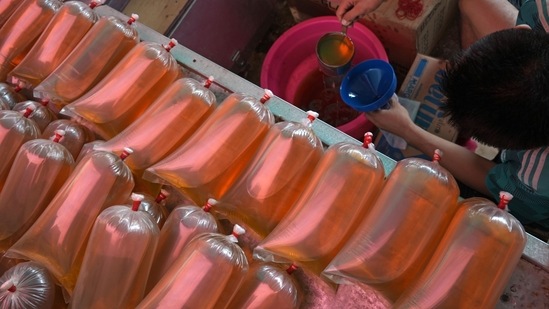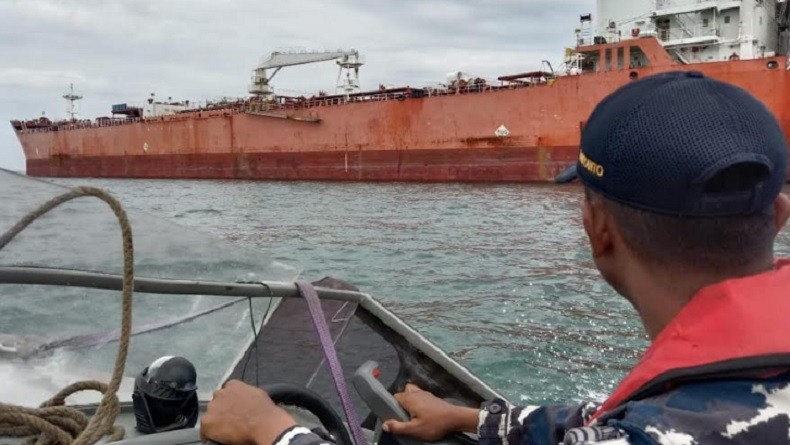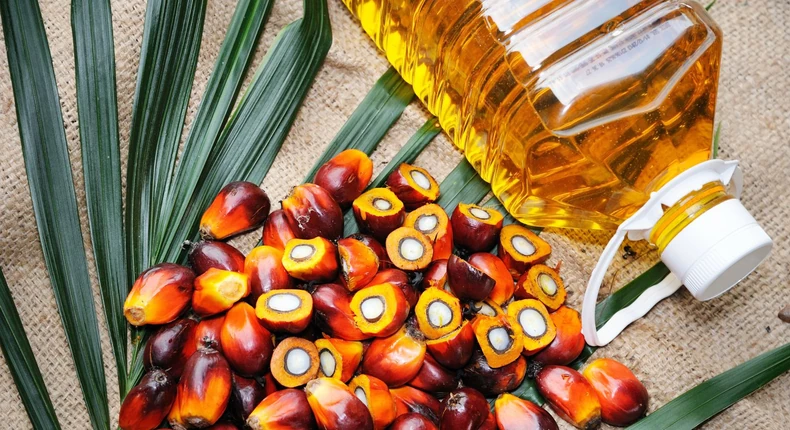>India is the world's biggest importer of palm oil and relies on Indonesia for nearly half of the 700,000 tonnes it takes every month
 ByAniruddha Dhar , New Delhi
Indonesia President Joko Widodo's drastic measures to control food prices by banning palm oil exports have come into effect from Thursday. India is the world's biggest importer of palm oil and relies on Indonesia for nearly half of the 700,000 tonnes it takes every month. Palm oil industry officials in India told news agency Reuters that the ban has trapped at least 290,000 tonnes of the edible oil meant to be headed to India at ports and oil mills in the world's top producer.
According to the officials, the disruption in shipments after Indonesia widened its export ban to include crude and refined palm oil will create a vegetable oil shortage in top importer India. They added that Malaysia, which is the second-biggest exporter, is already struggling to meet higher demand levels.
"Our vessel of 16,000 tonnes is stuck at Kumai port in Indonesia," said Pradeep Chowdhry, managing director of Gemini Edibles & Fats India Pvt Ltd, told Reuters. Chowdhry's firm buys around 30,000 tonnes of Indonesian palm oil every month.
ByAniruddha Dhar , New Delhi
Indonesia President Joko Widodo's drastic measures to control food prices by banning palm oil exports have come into effect from Thursday. India is the world's biggest importer of palm oil and relies on Indonesia for nearly half of the 700,000 tonnes it takes every month. Palm oil industry officials in India told news agency Reuters that the ban has trapped at least 290,000 tonnes of the edible oil meant to be headed to India at ports and oil mills in the world's top producer.
According to the officials, the disruption in shipments after Indonesia widened its export ban to include crude and refined palm oil will create a vegetable oil shortage in top importer India. They added that Malaysia, which is the second-biggest exporter, is already struggling to meet higher demand levels.
"Our vessel of 16,000 tonnes is stuck at Kumai port in Indonesia," said Pradeep Chowdhry, managing director of Gemini Edibles & Fats India Pvt Ltd, told Reuters. Chowdhry's firm buys around 30,000 tonnes of Indonesian palm oil every month.
With limited options left now, companies are now rushing to make purchases from Malaysia.
But Kuala Lumpur, Sandeep Bajoria, chief executive of Sunvin Group, a vegetable oil brokerage and consultancy firm lamented that it cannot fill the demand as Malaysian sellers are obliged to meet their old commitments and cannot provide palm oil for prompt shipments.
"There would be shortage in the market. There is no way to increase supplies," Reuters quoted Govindbhai Patel, managing director of trading firm G.G. Patel & Nikhil Research Company, as saying.
Last week, Widodo had imposed an export ban that covers nearly all palm products, which are used in staples like cooking oil, saying people's need for affordable food trumped revenue.
The move boosted his rating four points to 64.1 per cent in an independent survey of about 1,200 people conducted from April 20-25 - recovering slightly from when it slumped to 59.9 per cent earlier this week but still lower than the record high 75.3 per cent he enjoyed in January, news agency AFP reported.
Meanwhile reports also indicate that Indonesia's palm oil industry association GAPKI is working with government agencies and state companies to ensure the supply and affordability of cooking oil.
The association in a statement said it hopes the government would take follow-up measures to tackle rising cooking oil prices, warning a prolonged ban on exports of crude palm oil and its derivatives would hurt companies, smallholder planters and refineries.
https://www.hindustantimes.com/india-news/palm-oil-crisis-290-000-tonnes-for-india-stuck-after-indonesia-bans-export-101651139626991.html
(With inputs from agencies)
Dampaknya mulai kerasa di India. Mungkin bisa jadi bakal ada krisis minyak sawit di India dan menyebabkan kenaikan banyak barang pangan di sana
Fast-rising consumer
TNI AL Tangkap 2 Kapal Tanker Angkut Palm Oil saat Berlayar Menuju India dan UEA

TNI AL menangkap kapal Tanker MT World Progress yang tengah berlayar dari Dumai menuju India di Selat Malaka. (Foto: Dok. TNI AL).
DUMAI, iNews.id - TNI Angkatan Laut (AL) melalui unsur Komando Armada I KRI Beladau-643 menangkap kapal Tanker MT World Progress yang tengah berlayar dari Dumai menuju India di Selat Malaka. Selain itu TNI AL juga menangkap kapal MT Annabelle dari Kijing Pontianak menuju Shajarh, UAE di Perairan Barat Kalimantan, Rabu (27/4/22).
Panglima Komando Armada I (Pangkoarmada I) Laksamana Muda TNI Arsyad Abdullah mengatakan, Koarmada I selaku Kotama Operasional TNI AL yang bertugas melaksanakan operasi dalam rangka operasi militer untuk perang dan operasi militer selain perang mengimplementasikan dengan menggelar operasi penegakan kedaulatan dan hukum di laut yurisdiksi nasional Indonesia secara intensif.
“Intensitas operasi laut yang dilakukan TNI AL dalam hal ini Koarmada I membuahkan hasil, KRI Beladau-643 menangkap kapal tanker MT World Progress yang mengangkut Palm Olein 34.854,3 MT di wilayah perairan Selat Malaka yang merupakan perairan teritorial Indonesia,” ujar Arsyad dalam keterangannya, Kamis (28/4/2022).
Dia menjelaskan, MT World Progress merupakan kapal tanker berbendera Liberia dinakhodai Belov Alexander berkebangsaan Rusia dengan jumlah ABK 22 WNA (7 Russia, 6 Ukraina, 9 India). :
Kapal tersebut diduga melakukan pelanggaran dokumen dengan Spesifikasi GT kapal yang tertera pada salah satu dokumen berbeda dengan dokumen yang lain serta spesifikasi kapasitas mesin pendorong tertera pada salah satu dokumen berbeda dengan dokumen lain yang merupakan pelanggaran Pasal 302 ayat (2) Jo. Pasal 117 ayat (2) Undang-Undang No. 17 tahun 2008 tentang Pelayaran.
“Selain itu di tempat terpisah, KRI Siribua-859 juga menangkap kapal tanker MT Annabelle yang mengangkut Crude Palm Oil (CPO) sebanyak 13.357,425 MT dan Metanol sebanyak 98 drum (5 drum tersegel dan 93 drum telah terpakai di perairan Barat Kalimantan,” ucapnya.
Menurutnya, penangkapan MT World Progress dan MT Annabelle merupakan implementasi dari perintah pimpinan, Kepala Staf TNI Angkatan Laut (KSAL) Laksamana TNI Yudo Margono. KSAL, kata dia memerintahkan seluruh unsur operasi jajaran TNI AL untuk meningkatkan pengawasan dan pengamanan secara ketat serta menangkap dan memproses hukum bila menemukan adanya ekspor crude palm oil (CPO) atau minyak sawit beserta turunannya yang telah resmi dilarang melakukan ekspor oleh pemerintah.
"KSAL juga telah menekankan agar mendukung penuh kebijakan pemerintah dalam upaya pemulihan ekonomi nasional dan reformasi struktural dengan loyalitas tegak lurus" ucapnya. Dalam dua minggu terakhir TNI AL Koarmada I telah menangkap 5 kapal yang membawa muatan minyak sawit dan turunannya.
https://regional.inews.id/berita/tni-al-tangkap-2-kapal-tanker-angkut-palm-oil-saat-berlayar-menuju-india-dan-uea/2.
Respon cepat menangkap kapal ke India
di Korea juga mulai
Quote:
EDITORIAL from Korea Herald on April 27
More risks for economy
High inflation, depreciation of Korean won call for prudence from BOK policymakers
Russia's invasion of Ukraine, which exacerbates already troubled global supply chains, is not the only headache for the Korean economy to tackle. There is a growing list of risk factors, some of which warrant a careful analysis and, if necessary, decisive action.
As with other parts of the world including the United States and Europe, inflation is posing the most immediate and insidious threat. As if the war in Ukraine isn't bad enough,Indonesia's surprise palm oil export ban is forcing Korea's small restaurant and food delivery operators to find alternatives, or swallow sharply decreased profits -- or even losses.
Prices are racing to go up for other items, ranging from energy prices to consumer goods based largely on imports. Korea's consumer prices grew 4.1 percent in March from a year ago, the fastest on-year gain in more than 10 years due to higher commodity prices.
Fast-rising consumer prices, spurred by higher prices of raw materials and shortage of components imported from other countries, are eroding consumers' purchasing power, which in turn could dampen domestic consumption and cloud the growth outlook going forward.
No wonder, then, that Gov. Rhee Chang-yong, the new Bank of Korea chief, said Monday that he is more concerned about inflation than economic growth. Rhee's stance at his first press briefing since he took office marks a change in tone from his earlier focus on growth over inflation.
Rhee's remark came after the International Monetary Fund raised its inflation projection for Korea to 4 percent from 3.1 percent, and lowered its 2022 growth outlook to 2.5 percent from an earlier projection of 3 percent.
The central bank also projected that high inflation at this pace would push up wages for Korean workers, adding to more upward pressure on prices in a vicious cycle.
However, Rhee did not send a clear sign for a further interest rate hike in May, saying that the BOK will closely watch the US Federal Reserve's forthcoming rate decision. Fed Chair Jerome Powell said on Thursday that a rate hike of half a percentage point "will be on the table for the May meeting," suggesting that he is keen to rein in high inflation at a faster clip and cool down the overheating US economy.
But it is unlikely that the BOK will take its cue from the Fed by raising the benchmark rate dramatically in the coming months. The central bank already hiked its policy rate by a quarter percentage point in mid-April. It was the fourth rate increase since August last year.
Rhee said the central bank will monitor the financial market to see whether the Fed's brisk rate hikes, including an imminent "big step," could touch off capital outflow coupled with the weakening Korean won against the US dollar. He downplayed the risk of a weaker local currency, arguing the won's depreciation has not been as serious as that of the euro and other currencies.
But it remains to be seen whether the Korean won will sustain its value even if foreign investors dump Korean stocks and head for the US to seek higher interest income. The Korean won has depreciated 12.7 percent against the dollar from a year earlier.
In all fairness, Korea is in a relatively better position than Japan in terms of the exchange rate, given that the Japanese yen has dropped to a 20-year low against the dollar.
But there is no room for complacency, as the continued weakening of the Korean won will push up prices. Growth data is not pretty, either. The country's gross domestic product grew 0.7 percent in the first quarter this year, decelerating from a 1.2 percent increase in the fourth quarter of 2021, the data from the BOK showed Tuesday. The country is urged to take proactive measures including the currency swap deal with the US without delay.
(END)
https://en.yna.co.kr/view/AEN20220427000400315
Bisa-bisa harga makanan di Korsel naik secara inflasi di Korsel terus meningkat akibat perang Ukraina . Belum lagi dampak larangan sawit Indonesia..
Di Afrika
Quote:
Indonesia's threat to ban oil palm exports worries consumers across Africa — could Nigeria and other African exporters save the day?
>Indonesia recently shocked the world when it unexpectedly announced it was planning to ban oil palm exports.

Indonesia threatens to ban oil palm exports
Speaking during a telecast, Indonesia's President Joko Widodo vowed to "monitor and evaluate the implementation of this policy so availability of cooking oil in the domestic market becomes abundant and affordable".
Reuters reported that the move had inevitably sent oil palm prices soaring across the world.
Over here in Africa,
consumers are still very worried that such a move could greatly exacerbate food prices, as well as prices of other household essentials such as soaps.
Here's what you should know
Indonesia is one of the world's largest oil palm producers and exporters. The country, alongside Malaysia, account for as much as 85% of the commodity's global output, according to statistics obtained from The European Palm Oil Alliance. This explains why the country's threat had elicited unprecedented shock among oil palm exporters and consumers around the world.
The shockwave was particularly felt across Sub-Saharan Africa where quite a number of countries depend solely on imports to meet their oil palm needs. A good example of such a country is Kenya, where cooking oil prices have already soared by 30% since late 2021.
Following Indonesia's threat to ban oil palm exports,
Kenyan manufacturers expressed worry that the move could lead to a shortage of the essential raw material, according to Business Daily.
As you may well know, oil palm is essentially used for cooking. But besides being refined into cooking oil, it is also used by soap and cosmetics manufacturers as a major raw material.
Therefore, an export ban by a major exporter like Indonesia would not only result in a global shortage, it could also send prices soaring.
While an alternative would be for consumers to look elsewhere to meet their demands, the worry remains whether said alternative sources would be capable of meeting the huge demand for oil palm here in Africa.
Countries such as
Nigeria, Angola, Algeria, Libya and Egypt are among Africa's top producers of oil palm, according to Statista. Unfortunately, their collective annual output is hardly sufficient enough to meet local demands.
What happens now?
Luckily, Indonesia has since back-tracked on its earlier decision to completely ban exports. Business Insider Africa understands that the Southeast Asian country does not have enough storage infrastructure to manage the glut that would follow a total ban of oil palm.
Earlier this week, Indonesian officials informed oil palm marketers that the ban will now be on exports of refined oil palm products. In other words, crude oil palm and other derivative products could still be exported.
The latest update has considerably helped to relieve the panic experienced by global oil pam consumers over the past week. That notwithstanding, the development underscores the fact that Africa's oil palm producers need to double down their efforts so as to minimize the continent's dependence on imports.
https://www.pulse.ng/business/intern...xports/h9594v0
ini berita sebelum yang nulis tahu kalau semua minyak sawit dilarang Presiden Jokowi.. Bakal dampak besar ke Afrika juga secara Nigeria yang dulu eksportir minyak sawit sekarang importir minyak sawit... negara Afrika lain yang punya produksi minyaks awit nggak sebesar Malaysia apalagi Indonesia
Quote:
Indonesia starts palm oil export ban
Indonesia enforced a ban on exports of palm oil on Thursday to secure domestic supplies amid rising demand for the product in other parts of the world.
Indonesia is the world's biggest palm oil producer, accounting for nearly 60 percent of output. Retail prices of some types of cooking oil have risen by 70 percent from a year earlier, prompting demonstrations against the hikes.
There are concerns that the supply of sunflower oil, which is mainly produced in Ukraine and Russia, may be disrupted amid Russia's invasion. That is causing higher demand for palm oil as an alternative.
The Indonesian government says it will continue the ban until the average price of cooking oil falls to 14,000 rupiah per liter -- about a dollar -- from the current level of around 17,000 rupiah.
If the ban is prolonged, it could lead to a rise in prices of a wide range of goods because palm oil is used in many products, such as food and cosmetics.
Ueno Wataru at the Jakarta office of the Japan External Trade Organization said Japan imported
630,000 tons of palm oil last year, and 220,000 tons of it came from Indonesia. He said the prices of other cooking oils, such as soybean oil, could also soar.
https://www3.nhk.or.jp/nhkworld/en/n...s/20220428_07/
Harga minyak masak di Jepang terancam naik efek perlarangan ini
Kalau seminggu ini berlangsung gelombang inflasi besar-besaran tak terhindarkan...

